On August 4, 2018, Lum Gjika and his wife had chicken for lunch at one of Prishtina’s restaurants. Then they needed to seek medical help.
Lum’s wife had dizziness, vomiting and an upset stomach hours after they had finished lunch and arrived home. Less than two days later, Lum had the same symptoms.
“It was summer and very hot outside and I was completely shaking from a terrible fever,” says Lum, a 30-year-old economist who, due to the illness, said he had to miss work for five days.

Lum Gjika and his wife were diagnosed with Salmonella poisoning after eating chicken in one of Prishtina’s restaurants in August 2018. Photo: Arbëri Krasniqi.
After seeing a doctor at the Infectious Diseases Clinic of the University Clinical Centre of Kosovo (UCCK) they were diagnosed with food poisoning from the Salmonella bacteria, which is spread through food, usually eggs and chicken. Salmonella is one of the most common pathogens found in food that affects millions of people in any given year according to the World Health Organization (WHO).
In addition to headaches and stomach pain, fever, vomiting and diarrhea, the effects of this bacterial poisoning, especially in children and elderly patients, can sometimes be fatal, due to the severe dehydration it can lead to.
Food poisoning can also be caused by consuming food or water contaminated with other types of bacteria, parasites, viruses, toxins or various chemicals. Food becomes unsafe due to contamination occurring in the production chain from farm to table, with causes ranging from animal or plant health to the processing of products and storage conditions.
According to data provided to K2.0 by the National Institute of Public Health (NIPH), Salmonella is one of the most common poisonous foodborne bacteria in Kosovo, followed by Escherichia coli (E. coli), while the most common viruses to cause food poisoning are Rotavirus and Hepatitis A.
Valbon Krasniqi, an epidemiologist at the UCCK Infectious Disease Clinic, says symptoms of poisoning by Salmonella usually appear from six hours to four days after eating contaminated food. “In addition to stomach ache, the patient may have vomiting and diarrhea,” he says.
Lum was a victim of food poisoning again this year. This time he had fried eggs in a restaurant, on August 11, before attending a mass.
“Just before I went into the church, my vision started to blur,” he says. “I left the mass early and went to a clinic. They told me I had been poisoned.”
According to the Kosovo Agency of Statistics (KAS), Kosovars spend more than half of their family budget on food. Within a decade, from 2007 to 2017, average household income doubled, as did expenditure by Kosovar families in restaurants and hotels which on average raised from 100 to 200 euros per year.

Epidemiologist Valbon Krasniqi says that symptoms of poisoning by Salmonella bacteria usually present themselves between six hours and four days after consuming contaminated food. Photo: Arbëri Krasniqi.
The increased consumption of food outside of the home, especially in fast food restaurants, is increasing the risk of food poisoning. “Even in the context of trends in other countries and with the increased use of fast food, the number of poisonings is probably higher,” Krasniqi says.
Lum, for example, says that after being poisoned twice he is more careful about the origin of his food and now eats more regularly at home.
In another case, journalist Visar Duriqi decided in mid-June 2018 to stop at the Garden restaurant in Gjilan while travelling in the area. He ordered chicken risotto with mushroom sauce and did not notice anything strange with the food. About six hours later, the first signs of poisoning appeared.
“Initially it was severe vomiting with almost total dehydration,” he says. “Then diarrhea up to 12 or 13 times within 24 hours.”
Many other clients who had their iftar in the same restaurant were poisoned the same day. According to the Food and Veterinary Agency (FVA), 130 people who ate at the restaurant sought medical help.
Lamir Thaçi, an FVA spokesperson, says his institution began dealing with the case at the request of the State Prosecutor’s office. The agency’s analysis showed that the food contained Salmonella, Staphylococcus and E. coli bacteria.
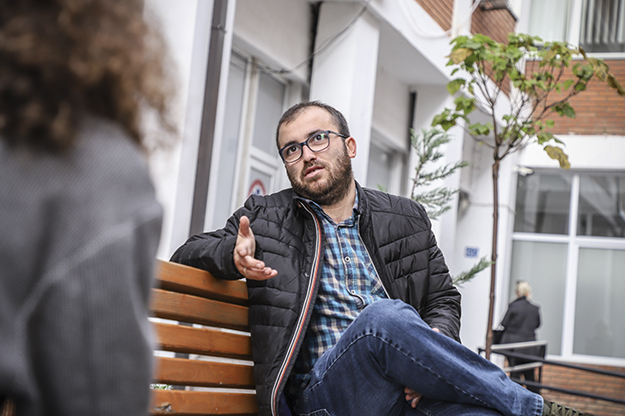
Visar Duriqi was one of 130 people who suffered food poisoning after eating at the Garden restaurant in Gjilan in June 2018. Photo: Arbëri Krasniqi.
Staphylococcus is a bacterium often found on human skin and in respiratory systems, and it is transmittable in contaminated food. The bacterium releases a toxin into the food that when consumed, causes nausea, severe vomiting and high fever. The foods most easily infected from this bacterium are eggs, meat, salads and dairy products.
E. coli on the other hand is a common type of bacteria known to cause stomach irritation and food poisoning. It is found in dairy products and red meat. Often it is obtained from eating or preparing food with unwashed hands.
These bacteria, according to the FVA, were in the mixed salad and mushroom sauce at the restaurant.
Following a medical examination at the Infectious Disease Clinic in UCCK, Duriqi was advised to be hospitalized for further checkups, but he signed a document voluntarily refusing the treatment. His condition continued for about a week.
“Any food or water I tried to consume, my digestive system would reject either via diarrhea or vomiting. The only nutrition I survived on was the IV treatment,” says Duriqi, who, due to his condition, also had a check-up in a private hospital and received the same diagnosis.
On May 16, there was another group poisoning, this time in Drenas. Having eaten in one of the kebab shops in town, about 100 citizens were poisoned. Most of them in this case had gone to the kebab shop for their iftar. According to the results of the analysis carried out by NIPH, there were poisonous bacteria in almost all of the food provided by the kebab shop.
Based on data provided by NIPH to K2.0, a total of 4,174 food poisoning cases were reported during 2017 and 2018.
Epidemiologist Krasniqi says the number of poisonings in Kosovo is always higher than reported. Citizens with milder symptoms do not seek any medical help and some go to private institutions for treatment. “As a result [these cases] are not recorded as poisoning due to the lack of a proper case reporting system within the medical institutions,” he says.
In its 2015 report on the global burden of foodborne illnesses, WHO estimates that around 600 million people worldwide fall ill after consuming contaminated food and about 420,000 die each year. Foodborne illnesses, according to WHO, particularly affect children under five and people living in impoverished regions of the world.
Food safety is part of the right to an “adequate standard” of living regulated by the Universal Declaration of Human Rights and the International Covenant on Economic, Social and Cultural Rights.
Meanwhile, the Office of the UN High Commissioner for Human Rights uses the phrase “right to food” and says that this it should be “available, accessible and adequate”; food safety is included as one of the elements within the right to adequate food. “Food should be safe for human consumption and free from adverse substances, such as contaminants from industrial or agricultural processes, including residues from pesticides, hormones or veterinary drugs,” states its Right to Adequate Food factsheet.
The UN General Assembly recently declared June 7 to be World Food Safety Day, and the first official day was marked earlier this year under the slogan: “Food safety, everyone’s business.”
In Kosovo, the Law on Food says that food is safe if “it can not cause adverse effects to human health if it is produced and consumed according to its intended use.”
But widespread poisonings, rotten meat and expired products scandals, the sale of dairy products in public markets without controls, improper slaughter of animals and similar irregularities signal problems with the ability to guarantee food safety.
An unconsolidated control and reporting system
According to the Law on Food, which entered into force in 2009, the primary responsibility for ensuring food safety in Kosovo lies with the FVA through veterinary (for animal products), sanitary (hygiene control) and phytosanitary inspectors (for plant origin products).
FVA spokesperson Lamir Thaçi says that food control in Kosovo is “the same as in European Union countries.”
“I can responsibly say that food products obtainable in the Kosovo market cannot be categorized as suspicious,” says Thaçi, adding that “citizens trust” his institution.
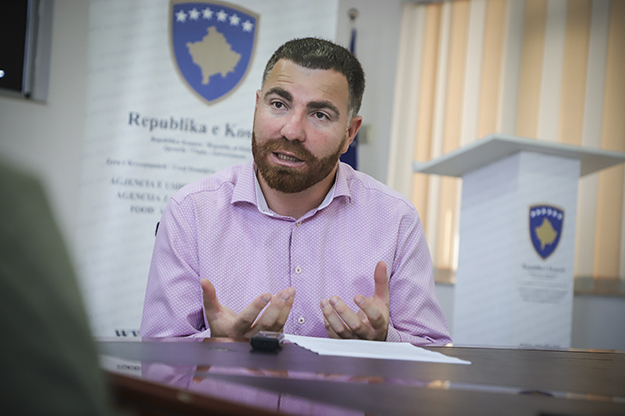
Lamir Thaçi, spokesperson for Kosovo’s Food and Veterinary Agency, says that food control in Kosovo is the same as in European Union countries and that consumers should have confidence in the food they buy. Photo: Arbëri Krasniqi.
But Kosovo lacks inter-institutional coordination for inspections.
The FVA claims that one of the main challenges in its work is the small number of inspectors; it has a total of 71 border and internal inspectors. When the Law on Food was adopted, it was expected (Article 39) that municipal inspectors would be integrated within the Agency to assist in food control. This legislation was seen as an improvement by the European Commission’s annual Progress Report, but the merging of inspectorates has yet to be implemented.
Municipal inspectors continue to conduct inspections, but they rarely report them to the Agency.
For example, according to data obtained by K2.0 from the Municipality of Prishtina, the Inspection Directorate has conducted 199 hygienic-sanitary inspections during 2018-19, in various markets, bakeries, kindergartens and restaurants in the capital in order to ascertain how foodstuffs are stored, including their shelf life.
“We constantly carry out inspections according to work plans or routine inspections … regarding the hygienic-sanitary conditions of various food products,” the Directorate said by email. According to the Directorate, the most frequent cases inspectors encounter are expired foods and exposure to poor sanitary conditions.
Because municipal findings are not reported to the FVA, there is no institution in Kosovo that collects and analyzes all food safety information at a national level.
Thaçi says that this is not for want of trying on the part of the FVA. “We have met all the requests presented to us, we have also signed memoranda of cooperation with 99% of municipalities for the transfer of inspectors, but this has not happened due to some problems related to the transfer of municipalities’ finances to us,” he says.
According to Article 27 of the Law on Food, periodic and annual reports should be prepared by the agency on previous inspections containing details such as the number and the type of inspection, number and type of samples taken for inspection, number and type of premises where inspections are conducted, and records of measures taken in cases of non-compliance with the requirements set forth in this law.
The agency has not published any annual reports on its work and has not sent K2.0 any unpublished annual online reports, despite a request for access to public documents. The FVA website only contains some general information on its work and it’s legal basis. It also has some incomplete reports of official check ups which only show some inspection figures with no conclusive findings.
Data released by the FVA for 2018 shows that 47,000 official cargo inspections were carried out at border crossing points and 7,200 inspections were carried out through internal inspections. The same document states that 4,650 samples and 987 strips were collected for laboratory analysis.
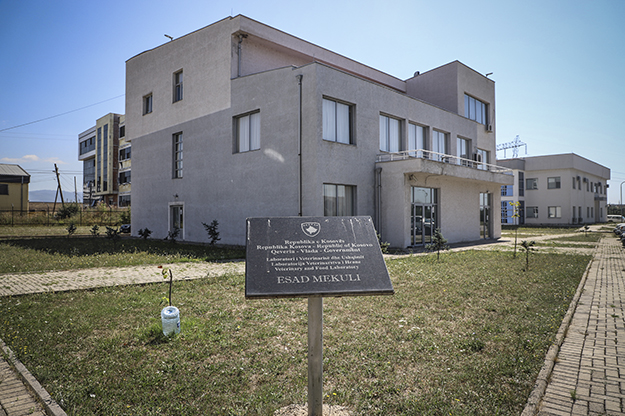
The FVA carries out thousands of inspections every year, however public information about its work is limited and its data incomplete. Photo: Arbëri Krasniqi.
The agency claims it destroyed more than 775,000 kg/liters of products, 197 animals, 135 beehives and 23,540 saplings of various species during 2018. But the data does not detail the types of samples, the premises at which inspections were conducted, nor any detailed findings from the inspections. The agency did not provide any figures to K2.0 after this information was requested.
According to professor of food hygiene at the University of Prishtina, Afrim Hamidi, continuous reporting is required on the work of the institutions responsible for food safety because “food safety is only proven when we know that it is subject to routine controls.”
“In addition to the annual report, we need a report at least every six months, so that consumers are familiar with food safety trends in our country,” he says.
NIPH is another institution that aims to monitor and research foodborne diseases as well as prepare and implement a public health strategy in Kosovo. Drita Zogaj, a human ecology specialist at the institute, says the control plan for food safety and determination of the type of samples for laboratory analysis at the institute is done by FVA.
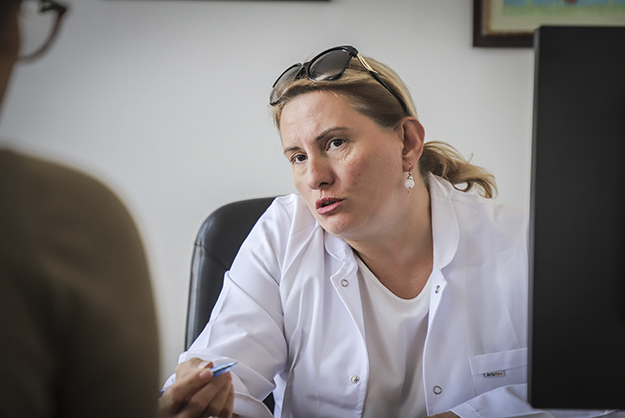
Drita Zogaj is a human ecology specialist at Kosovo’s National Institute of Public Health, which helps to carry out food safety tests and laboratory analysis. Photo: Arbëri Krasniqi.
Zogaj says that NIPH usually obtains samples from customs points, but not internal samples taken in kebab shops,traditional diners, butchers, and so on. “We cooperate with the FVA within the legal framework, we have the capacities, and let the agency determine if we are being utilized properly,” she says.
What makes the food safety situation even more opaque is the lack of quality information on the exact causes of health complications generally originating from unsafe food.
Data released to K2.0 by UCCK shows that in 2018 and the first half of 2019 there were 1,165 cases of hospitalizations diagnosed with symptoms related to gastrointestinal tract and digestive tract complications (cases with Acute Gastroenterocolitis and Acute Enterocolitis in table, below) or that were given a general diagnosis of “food poisoning.” These illnesses are mostly caused by unsafe food, but UCCK says it has not always managed to isolate the bacteria or viruses that have caused them.
In fact, the data released show that in the vast majority of cases only the symptoms have been registered. Only in 51 cases were the causes of infections identified — cases (in table, below) with diagnosis of Salmonellosis, Dysenteric syndrome, Giardiasis (Lamblia / Intestinalis), and Amebiasis.
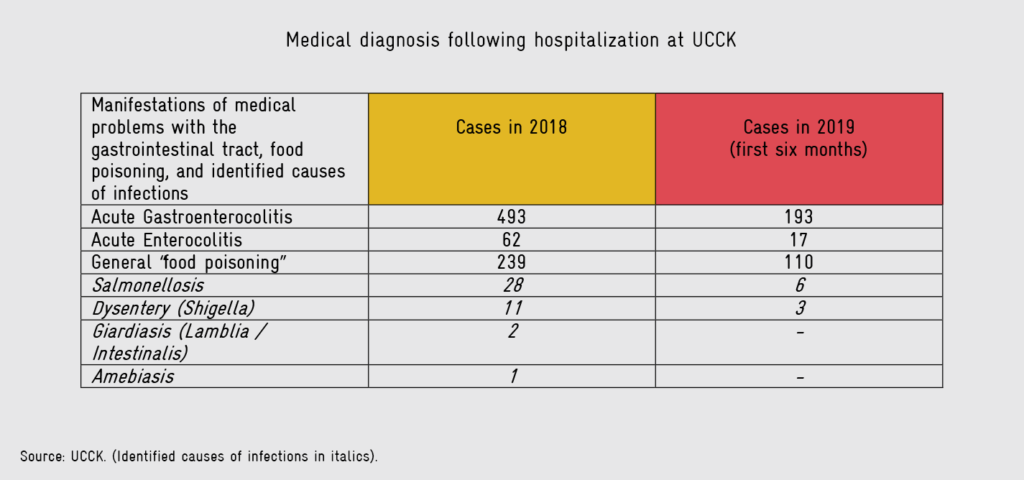
Usually, the poisoning symptoms caused by bacteria and viruses are almost the same and are accompanied by vomiting, diarrhea, cramps, headaches and dizziness. They pass within several hours or days. However, epidemiologist Krasniqi says there are cases when “bacteria or viruses, entering the blood can pass into other organs such as the liver or lungs and could cause diseases or consequences later.”
Such cases, for example, happen when E. coli passes into the urinary tract and causes chronic infections or when it passes into the lungs, causing problems in the respiratory tract and even pneumonia in rare cases.
As with similar bacteria, the risk is that they may become resistant to antibiotics and cause chronic infections.
The UN warned earlier this year that if we don’t take proper measures, diseases caused by antimicrobial resistance may cause up to 10 million deaths by 2050. According to the EU Action Plan on Antimicrobial Resistance, 33,000 deaths occur per year due to antimicrobial resistance in the EU.
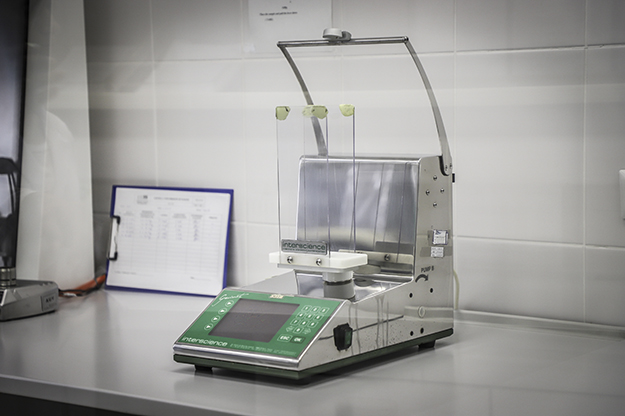
Antibiotics are widely available without prescription in Kosovo, while resistance-indicating microorganisms in Kosovo are two to five times higher than the European average for almost all comparative antibiotics. Photo: Arbëri Krasniqi.
Kosovar citizens may be overly exposed to antibiotics because they can easily purchase them without a medical prescription and they consume products unchecked for the presence of antibiotics. According to the data presented in the Strategic Plan on Antimicrobial Resistance, resistance-indicating microorganisms in Kosovo are two to five times higher than the European average for almost all comparative antibiotics. Kosovo ranks among those countries with the highest rate of antibiotics use in Europe.
A lack of food safety inspections raises the risk of uncontrolled levels of antibiotics, as well as other chemical contaminants such as pesticides, toxins, hormones and heavy metals, ending up in the food chain. The presence of these contaminants, over the values permitted in food, present a serious and long-term risk for human health due to the damages they cause in different bodily organs and their carcinogenic effects.
In Kosovo, there is rarely any publicity about the risks unsafe food brings.
“When intoxication scandals are made public, they surely indicate signs of poor food control,” says Agim Rysha, a professor in the Food Technology Department at the University of Peja. “Nevertheless, I am more concerned about the problems related to chemical contamination that are not discussed at all.”
According to Rysha, these chemical contaminants that can be found in contaminated food, target specific organs in the body and can remain in a passive state for many years without showing any symptoms. “If we don’t perform routine checks … we can never be sure about the level of antibiotics or pesticides in the products we consume,” Rysha says.
The FVA has never presented any data or study regarding the presence of chemical contaminants in food items in Kosovar markets.
Meanwhile, KPIH says that no tests are conducted in their laboratories on the presence of these components.
“Such studies are not conducted because this is not up to our Institute to do it,” says specialist Drita Zogaj. “The [Food and Veterinary] Agency does the monitoring plan and the activity plan, while we depend on them and the samples they send.”
Afrim Hamidi from the University of Prishtina, says that the general situation of food safety is “very sad.”
“The consumers pay for that food,” he says. “Not only do they not get any nutritional value, but they are even poisoned.”
Meanwhile, Professor Rysha says that the lack of coordination between the responsible institutions shows that Kosovo has not built a quality system for food control. Their poor functioning, in his view, “automatically affects public health.”
Very few cases end up in courts; no one goes to jail
On August 21 this year, shortly after the celebration of Kurban Bajram, FVA inspectors discovered that 21 tons of meat, which were stored in an Islamic Community of Kosova (BIK) warehouse and were destined as charity for poor people during the holiday, was rotten.
“From this inspection … we found that the meat had begun to change color, some of the packages were leaking blood,” FVA spokesperson Lamir Thaçi told the press. “This shows that the meat had been defrosted and re-frozen, and [the meat] stank.”
BIK issued a press release saying the rotten meat was only part of the total quantity it had purchased in Kosovo, and committed itself to understanding why it was rotten and resolving the issue. According to the FVA, the meat warehouse was not licensed.
The Prishtina Basic Prosecution’s office has begun investigating, and no further details are known, including whether the meat caused any ill effects to the poor people to whom it was destined.
Similarly, little information is known about the other recent cases where mass food poisoning has been reported, such as the cases in Gjilan and Drenas, because the relevant information from the justice system is generally lacking.
In summer 2019, about a year after the mass poisoning in Gjilan’s Garden restaurant, the Gjilan Basic Prosecution’s office filed a lawsuit against the defendant Fatmir Korçaj (the restaurant’s chef) and the legal entity “Enesi Group” Ltd. — led by Ganimete Behluli — which owns the restaurant. But the Prosecution’s office did not respond, when contacted to provide further details, and it could not be confirmed whether the judicial process has started.
Regarding the Drenas poisoning at the “Toni” diner and Kebab shop, the Prishtina Basic Prosecution’s office was contacted by K2.0 but it did not give any details on how it has proceeded with the case and what phase the investigation has reached.
Florent Spahija, a legal adviser at the Kosovo Democratic Institute (KDI), says there is in general a huge discrepancy between the poisoning statistics issued by health institutions and sentences issued by justice institutions. “It is normally difficult to prove that the offense was committed intentionally, but negligence must also be punished,” Spahija says.
According to data released to K2.0 by Kosovo Judicial Council, the courts have handled less than 30 cases related to production and circulation of harmful food products a year during 2016-18, and they have generally managed to close less than one third of ongoing cases.
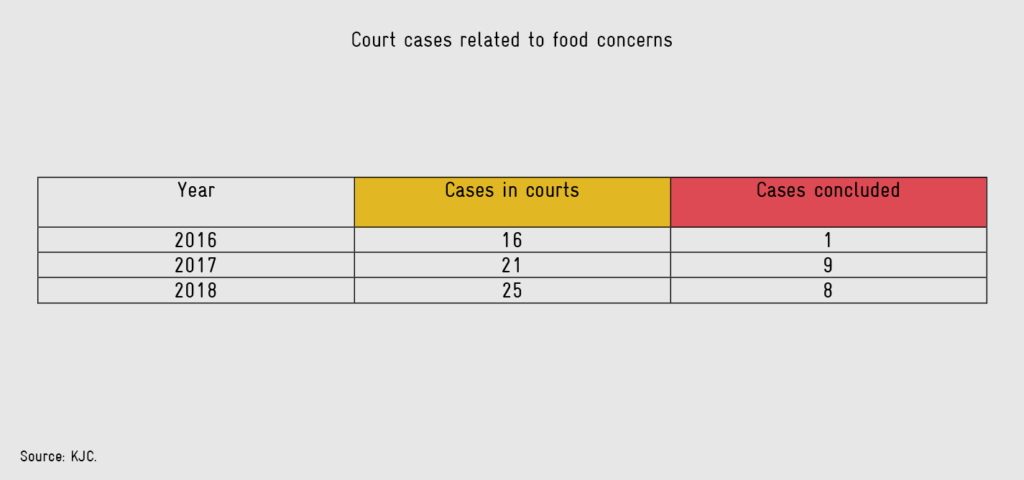
Visar Duriqi, poisoned in the Gjilan case, says he feels disappointed that none of the responsible institutions for the investigation of the case has ever even invited him to testify about the poisoning.
Neither the numerous food scarcity scandals nor the high figures of food poisoning of citizens have pushed the justice institutions to make a strong statement to those responsible for damaging human health.
In the Criminal Code of Kosovo, specifically Article 261, the production and circulation of harmful food items is considered a criminal offense. It says: “Whoever produces with the intent to sell, sells, offers for sale or in any other manner puts into circulation food items, drinks or other products which the perpetrator knows to be harmful to people’s health shall be punished by a fine and imprisonment of three (3) months to four (4) years”.
In cases where such a violation causes serious harm to a person’s health, imprisonment of up to eight years is recommended.
Data obtained by K2.0 from the Kosovo Judicial Council shows that in the last three years, no case has been resolved with the most serious punishment — imprisonment.
The data indicates that out of 18 finalized cases, three had a fine issued, four ended in probation, one with an acquittal, two with other convictions, seven solved in mediation or related methods and one exceeded the statute of limitations.
Some cases show that the small fines do not stop harmful behavior.
For example, in 2017 the butcher Sali Shkuliqi was given a suspended sentence of three months’ imprisonment (which he was not required to serve unless he committed another criminal offense within one year) and a fine of 150 euros by order of the Basic Court of Peja. According to the indictment obtained by K2.0, Shkuliqi was detained by Kosovo Police that year while transporting a sick cow he had knowingly purchased and intended to slaughter.
In January this year, 1,089 kg of rotten meat, destined for public consumption, were confiscated from Shkuliqi. Because of this case, he was arrested, together with three other persons.
According to the indictment from the Basic Prosecution in Peja obtained by K2.0, “on January 16, 2019 the defendants Sali Shkuliqi, Rexhë Shala, Muhamet Berisha, Jeton Berisha, acting in cooperation, have put into circulation food items harmful for health, of which the defendants were aware.”

Premises where the slaughter of animals takes place are required to be licensed to help ensure appropriate hygiene standards. Photo: Arbëri Krasniqi.
The meat was considered a harmful article — which is sanctioned by the Criminal Code — because it was, according to case documentation, processed after the accused slaughtered a sick cow, and because Shkuliqi’s workshop was unlicensed and had poor hygiene standards.
Muhamet Berisha, having failed to heal the sick cow, with the help of Jeton Berisha, telephoned Sali Shkuliqi to sell him the cow, according to prosecution documents. Shkuliqi, along with Rexhë Shala, went to Muhamet’s barn and bought the cow for 400 euros. They butchered the sick animal, loaded it into a car, and transported it to Shkuliqi’s workshop.
“While having tea at the tea shop, I met two butchers by chance and told them I had a cow to sell. They came and bought the cow,” said Berisha, according to the Prosecution’s documentation. “In my barn they butchered the cow, skinned it and chopped it, then took the meat and left. The cow was sick, twice it was treated with injections by the veterinary doctor, who told me that the cow had stomach problems. After we butchered it, we noticed that the lungs were white — sick.”
Shkuliqi, in his defense, told the Prosecution that he had been working as a butcher since after the war, dealing with buying, processing and selling meat.
“I am not licensed and do not have a business registered with the authorities responsible for the activity, nor do I have permission to run a workshop for doing so,” he said. “I know that there is a required procedure to butcher an animal … but since this procedure costs, and in order to make a profit, I sometimes do not respect the procedures.”
There are special regulations for different types of activities related to butchering meat, food circulation and maintenance. For example, the Administrative Instruction on the Certification of Slaughterhouses, Meat Processing Plants and Their Inspection (Article 23), stipulates that business entities engaged in such activities must be licensed by the FVA, which must inspect meat production and processing facilities.
After having received information about Shkuliqi’s case, the Kosovo Police informed the municipal and FVA inspectors, who all inspected the workshop together. Apart from the meat from the sick cow, they also found other rotten meat.
The FVA inspection record, also cited in the indictment, states that meat and meat products were found in two facilities and in old freezers. “The meat stank badly and had darkened,” it said. “Also, the place where the meat was stored was in extremely poor condition, dirty and the equipment was corroded, muddy, dungy.”
Shkuliqi denied these allegations in court, saying that the meat was not for public consumption. “I swear to God that I have not taken that meat for sale; it was destined for my dog,” he said.
According to allegations reported on Kallxo.com, the suspects were supplying some burek shops, as well as sausage and ham producers. According to the Peja court, the case is still pending and there has been no final decision.
Florent Spahija, KDI’s legal adviser, says that the Kosovo Judicial Council should check, through its control mechanisms, why such cases have not been prosecuted more often. He also points to cases ending unfinished due to exceeding the statute of limitations. “If [judges] have deliberately not acted upon [cases], then measures should be taken against the judges,” he says.
Spahija also says that the state should enable food poisoning cases to be reported directly from Family Medical Centers or hospitals to the competent authorities such as the police or Prosecution. “Since it is a criminal offense, it should not be left to the damaged party alone to report the case to public authorities,” he says.
Because of the low trust in the institutions and failure to guarantee justice, many citizens hesitate to even file complaints, despite the consequences of poisoning.
Lum Gjika has not complained anywhere. He says that in addition to trying to eat at home, he now buy products from the European Union, trusting that if he needs to file a complaint, a response will follow from either the producers or their respective countries.
UNDP, in its Public Pulse report, shows that since 2010, citizens have shown the lowest trust in the country’s prosecution offices and courts compared to other institutions, in an atmosphere of generally low trust in the state institutions.
Meanwhile, the FVA, in an emailed response to K2.0, said it does not even possess an exact number of citizens’ complaints presented to the institution, because the complaints “are made in different forms, by phone, social media networks, official agency address, etc.”
The Ombudsman’s Office replied that the consumer’s right for access to safe food is an important component with a permanent impact on the economic and social development of the country: “Effective prevention and consumer protection requires the continuous dedication and commitment of state institutions, which are obliged to do so in conformity with the legislation in power.”
Feature image: Arbëri Krasniqi.
Edited by Artan Mustafa.
Additional editing: Besa Luci, Jack Butcher and Bronwyn Jones.
This article has been written as part of the second cycle of the Human Rights Journalism Fellowship Program supported by the European Union Office in Kosovo, co-financed by the project ‘Luxembourg support to civil society in Kosovo,’ financed by the Government of the Grand Duchy of Luxembourg and managed by Kosovar Civil Society Foundation (KCSF), as well as from the National Endowment for Democracy (NED). This program is being implemented by Kosovo 2.0, in partnership with Kosovar Center for Gender Studies (KCGS), and Center for Equality and Liberty (CEL).
Its contents are the sole responsibility of Kosovo 2.0, KCGS, and CEL and do not necessarily reflect the views of the donors.
















